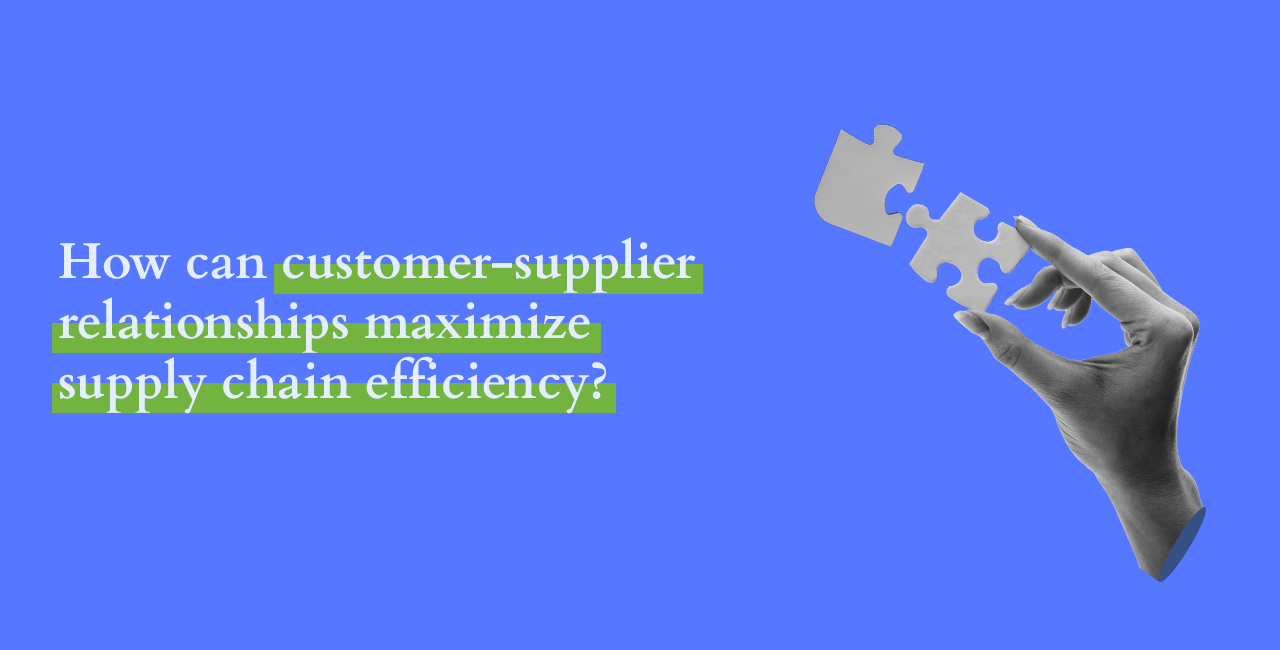Fostering strong customer-supplier relationships is a key factor in achieving success in today’s interconnected business landscape. Effective supplier partnerships strengthen the supply chain, helping businesses adapt to market changes and remain competitive.
This article examines the value of a mutually beneficial customer-supplier relationship across industries such as digital services, manufacturing, retail, and commodities. It also offers strategies to strengthen these partnerships and turn them into drivers of business growth.
Understanding Customer-Supplier Relationships
A customer-supplier relationship forms the foundation of a business’s supply chain, ensuring the flow of goods, services, and raw materials into the company. These relationships are not just transactional; they are strategic assets that businesses can develop to achieve a variety of beneficial outcomes, including:
- Competitive advantage
- Product quality improvements
- Cost savings
- Continuous improvement opportunities
By fostering strong customer-supplier relationships, businesses can unlock loyalty from both customers and suppliers, leading to long-term success.
Building Long-Term Success With the Right Customer-Supplier Relationship Model
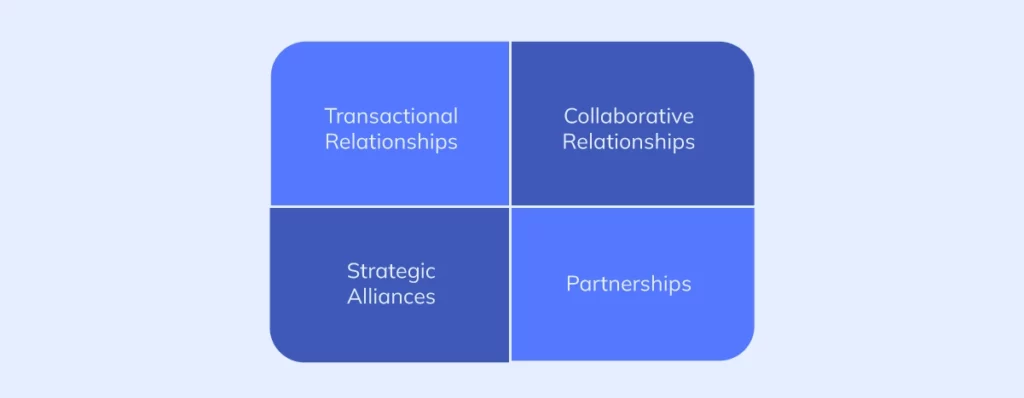
Effective supply chain management depends on selecting the optimal relationship model with each supplier. There are typically four main types of customer-supplier relationships:
- Transactional Relationships: Short-term, one-off interactions focused on specific purchases. Collaboration is minimal, and information sharing is limited.
- Collaborative Relationships: Medium-term engagements where both sides share information and work together on projects while keeping flexibility to work with other partners.
- Strategic Alliances: Long-term relationships built on trust, transparency, and shared information. Often supported by exclusive agreements for large-scale operations. Tools such as Bancoli’s Guaranteed Invoices can strengthen these alliances by enabling early payment access in exchange for offering discounts to customers.
- Partnerships: The most integrated form of supplier relationship. Partnerships are based on mutual benefits and shared long-term objectives, with both parties investing in each other’s success and growth.
A well-chosen relationship model helps optimize the supply chain, reduce risks, and build sustainable growth opportunities.
The 4 Pillars of a Strong Customer-Supplier Relationship
The foundation of a strong customer-supplier relationship lies in four core principles: effective communication, mutual cooperation, unwavering commitment, and continuous improvement.
These pillars support a resilient supply chain and help both parties achieve sustained growth.
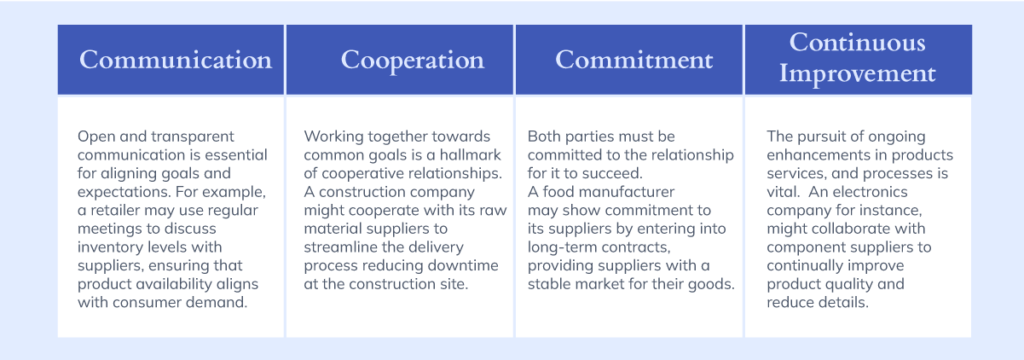
- Communication: Ensures both sides align on goals, expectations, and strategies. This supports smooth interactions, reduces misunderstandings, and improves operational outcomes.
- Cooperation: Involves active collaboration, creating an environment where both businesses work together to address challenges and achieve shared goals.
- Commitment: Long-term dedication strengthens trust and enhances the relationship, resulting in better outcomes for both customers and suppliers. Bancoli’s Know Your Vendor Verification can reinforce this trust by pre-verifying partners and reducing compliance risks.
- Continuous Improvement: Ongoing innovation and process enhancements contribute to long-term success, improved quality, and greater efficiency within the supply chain.
Benefits of a Strong Customer-Supplier Relationship
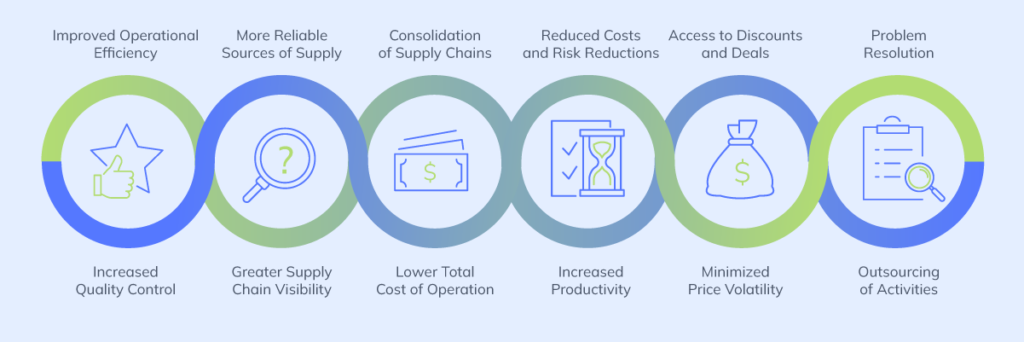
A strong customer-supplier relationship delivers operational and financial advantages that strengthen the supply chain. These benefits help businesses improve efficiency, reduce costs, and build long-term resilience.
1. Improved Operational Efficiency
Strong relationships improve communication and understanding, which streamlines operations and reduces delays. This results in a smoother supply chain and consistent product or service delivery. Tools like Bancoli’s Global Payment Gateway can further accelerate transactions, ensuring suppliers are paid quickly and reliably.
2. Increased Productivity
When customers and suppliers adapt to each other’s needs, waste decreases and productivity rises. Collaboration improves resource utilization and removes operational bottlenecks, creating capacity for growth.
3. Enhanced Quality Control
Collaborating closely with suppliers ensures that the products or services provided meet quality standards. This partnership reduces defects and maintains consistency across projects, improving customer satisfaction and reducing rework costs.
4. Supply Chain Stability and Insights
Building solid relationships with suppliers helps ensure a reliable flow of goods and services, contributing to a more stable supply chain.
Supplier relationship management (SRM) tools enhance visibility within the supply chain, enabling businesses to anticipate risks and respond proactively to changes in demand, inventory levels, or supply chain disruptions.
Consolidation of the Supply Chain
Consolidating suppliers and working with fewer, trusted partners simplifies the supply chain and improves efficiency. This approach reduces logistics and procurement costs while strengthening supplier relationships and enhancing operational performance.
A consolidated supply chain also gives businesses greater control over the flow of goods and services, enabling faster responses to market demands and lowering complexity.
Lower Total Cost of Operations
Negotiating better terms with key suppliers can deliver significant savings. Long-term, mutually beneficial relationships help reduce operational costs by minimizing the need to find and onboard new suppliers.
Favorable terms and discounts are common in long-standing partnerships, further boosting cost savings.
Reduced Costs and Risk Reduction
Strong customer-supplier relationships support cost savings through preferential pricing and discounts.
Consistent, recurring commerce reduces the financial risks of working with unreliable suppliers. This stability ensures a dependable flow of goods and services.
Access to Discounts and Deals
Businesses with strong supplier relationships are more likely to secure attractive deals, such as cash discounts or reduced pricing.
These agreements improve the bottom line, build goodwill, and encourage long-term partnerships, which are essential for a healthy supply chain.
Minimized Price Volatility
Trust is vital in any customer-supplier relationship. When challenges arise, trust motivates both parties to work together toward solutions.
It also enables the outsourcing of non-core activities, such as inventory management, to suppliers. This collaboration improves efficiency, leverages supplier expertise, and lowers costs.
Operational Benefits Through Trust and Cooperation
Trust encourages effective collaboration to solve problems. It allows businesses to delegate non-core tasks, such as inventory management, to suppliers.
This cooperation streamlines operations, improves inventory management, and underscores the operational advantages of a strong partnership.
Building a Strong Customer-Supplier Relationship
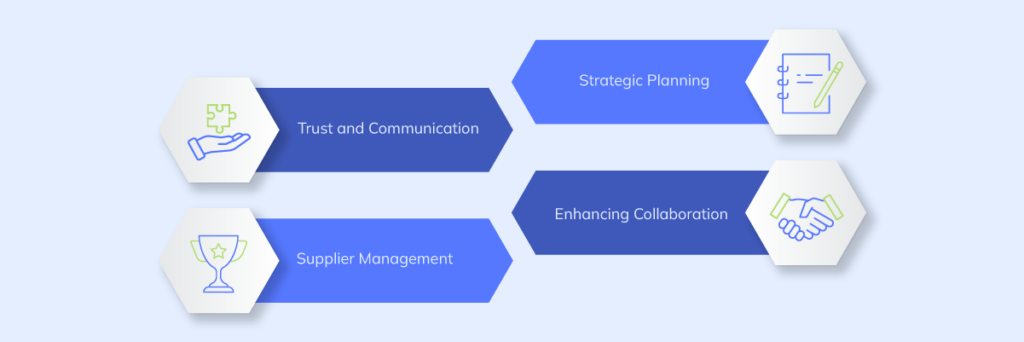
Improving customer-supplier relationships is key to the resilience and success of any business. Here are some strategies to enhance these relationships:
- Set Clear Expectations from the Beginning: Establishing mutual expectations early in the relationship sets the stage for effective communication and collaboration.
- Build Trust through Transparency: Being open about business goals and challenges fosters a culture of trust. Suppliers who understand your needs can offer better service and value.
- Improve Communication: Regular, transparent communication helps keep both parties aligned, ensuring expectations are met and potential issues are identified early.

Leveraging Technology and Strategic Planning
Technology plays a crucial role in optimizing supply chain management. By utilizing digital tools, businesses can improve communication, automate processes, and gain valuable insights into their suppliers’ performance.

- Leverage Technology: Utilizing digital tools enhances communication, automates transactions, and provides valuable insights into supplier performance.
- Develop Contingency Plans: Prepare for potential risks with alternative sourcing strategies to ensure business resilience.
- Align Management Strategies with Objectives: Ensuring that supplier management strategies support overall business goals, optimize efficiency, and effectiveness.
Enhancing Collaboration and Partnership
Establishing and nurturing strong customer-supplier relationships is essential for business growth. These relationships are built on shared goals, knowledge-sharing, and effective collaboration.

- Synergy Through Collaboration: Engaging suppliers as strategic partners and involving them early in the development process encourages innovation and adds value.
- Conduct Regular Performance Reviews: Evaluating supplier performance against KPIs and providing feedback promotes continual improvement and recognizes excellence.
Strategic Supplier Selection and Relationship Management
Effective supplier relationship management begins with selecting the right supplier and addressing potential concerns upfront.

- Choose the Right Supplier: Select suppliers whose values and objectives align with your business goals to ensure they meet contract terms and contribute to your company’s success.
- Address Challenges Upfront: Proactively addressing any potential issues builds trust and creates a foundation for a strong, long-lasting partnership.
- Make Trust Management a Priority: Elevating trust management within the organization, particularly at the C-suite level, underscores its importance in fostering healthy customer-supplier relationships.
Global Trust: The Role of Efficient International Payments
Efficient international payments are crucial for maintaining strong customer-supplier relationships, particularly in global supply chains. Timely and cost-effective payment solutions help build trust, reduce price volatility, and ensure the smooth operation of business operations across borders.
International payment solutions that are both fast and affordable help businesses strengthen their supply chain by ensuring payments are processed efficiently. These solutions contribute to a stable and predictable financial flow, which is essential for smooth global business operations.
Maximize Trust Through Timeliness and Efficiency
When suppliers receive payments on time, it reinforces their trust in the buyer’s reliability and financial stability. Efficient payment processing is crucial for establishing and maintaining long-term, trusted relationships with suppliers and partners.
Businesses that prioritize timely payments demonstrate a commitment to their suppliers, fostering an environment of mutual respect and collaboration. This reliability strengthens the supply chain, creating a foundation for more effective partnerships and smoother business transactions.
Boosting Operational Efficiency Through Timely Payments
Timely payments also contribute to the overall efficiency of the supply chain. By reducing the time and effort required to process payments, businesses can focus on other critical areas such as inventory management, logistics, and customer service.
Efficient payments ensure that funds are readily available when needed, helping businesses avoid disruptions and allowing them to reinvest resources into other aspects of their operations. This improves operational performance and provides a competitive edge in the global market.
Conclusion
Building and maintaining strong customer-supplier relationships is essential for business resilience and growth. By understanding the types of relationships within the supply chain, implementing strategic management practices, and ensuring timely and efficient international payments, businesses can create a supply chain that not only withstands market fluctuations but thrives in a competitive environment.
The key to success is viewing suppliers as strategic partners, not just vendors. Strong supplier partnerships are crucial to a business’s overall growth and success.


